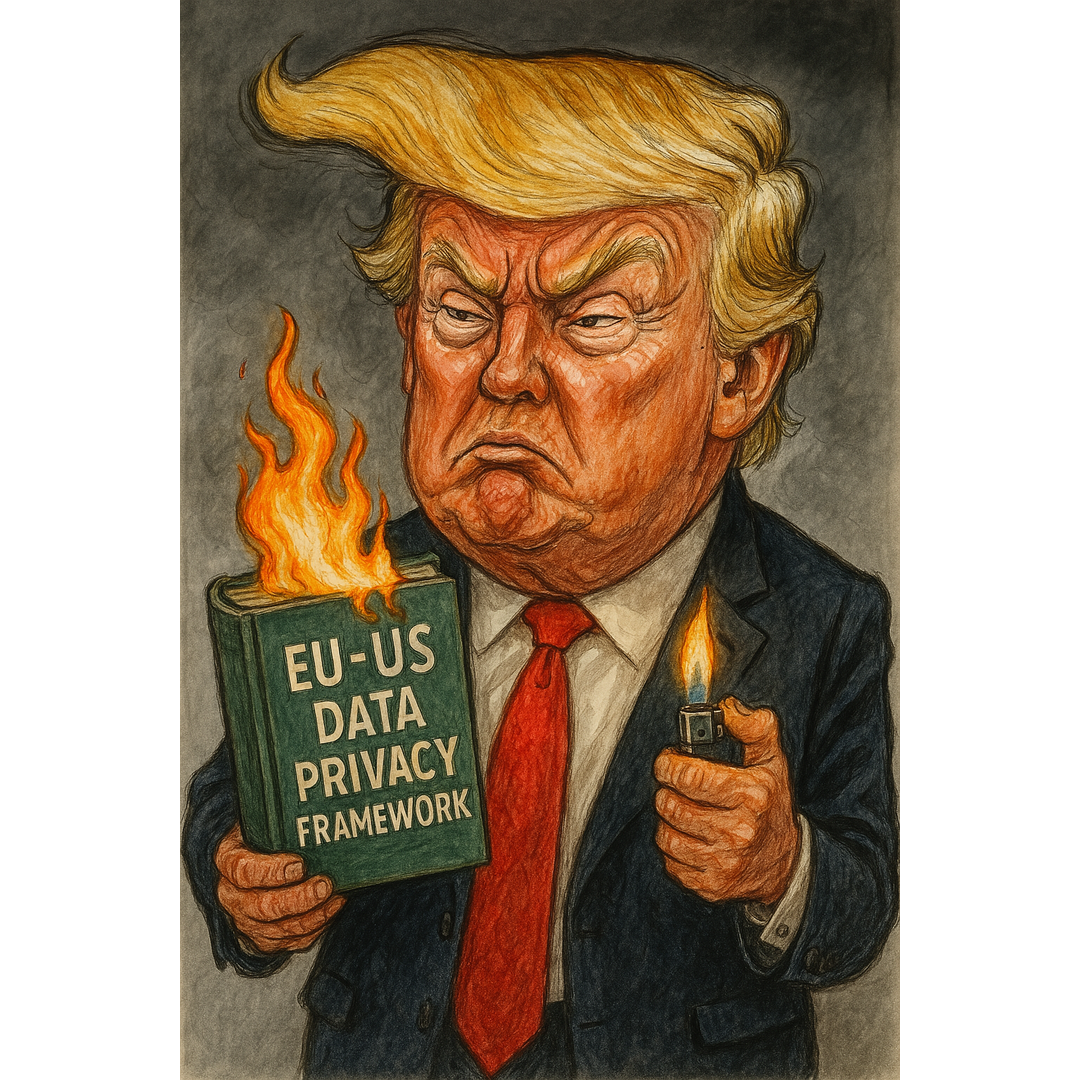‘You're Fired'—What Trump’s Regulatory Sackings Mean for EU & US Data Relations
President Trump’s recent sacking of FTC Commissioners & disbanding of the PCLOB is worrying. It’s a major shift in policy, but also calls into doubt the independence of the watchdog orgs. This may cause the EU pause on whether the US remains ‘adequate’ for cross-border data transfers.

President Trump’s recent sacking of Democratic FTC Commissioners Alvaro M. Bedoya and Rebecca Kelly Slaughter last week, as well as the dismissal and effective disbanding of the Privacy and Civil Liberties Oversight Board (PCLOB) in late January, has many of us in the privacy community sweating (and possibly swearing) a bit. Notwithstanding whether these moves are legal (Bedoya and Slaughter have already filed a suit against the administration), the neutering of both watchdog orgs may give the EU pause on whether the US remains ‘adequate’ – at least when it comes to cross-border data transfers and the EU-U.S. Data Privacy Framework.
Both agencies were explicitly cited in the European Commission's 2023 adequacy decision as key independent safeguards that protect European data from Uncle Sam's watchful gaze. Without them, the legal foundation for transferring EU citizens' data to American soil (and data centers) is about as stable as a house of cards in a wind tunnel.
The Impact at Home …
This isn’t just a political flex—it’s a seismic shift in how the agency operates. Legally, this move is murky at best. Unlike some other government departments, the FTC was designed to be independent, with rules dating back to 1914 limiting the President’s power to remove commissioners. Trump’s executive order challenges this, brushing aside nearly a century of precedent, including the Supreme Court’s ruling in Humphrey’s Executor. No doubt the Bedoya/Slaughter case will test the limits of this move, and the administration is likely to face an uphill battle—courts have historically ruled against similar dismissals—but for now, the firings stand.
Despite the sackings, the FTC (unlike the PCLOB) retains a quorum and can continue day-to-day operations, and the likely confirmation of Republican nominee Mark Meador will further cement the FTC’s rightward tilt. ARepublican-controlled commission means that priorities are expected to shift. FTC Chairman Andrew Ferguson has pledged to stop using FTC enforcement as a substitute for federal privacy legislation, scrap AI bias investigations, and plans to pursue fewer corporate crackdowns, especially against tech companies who curry favor with the administration.
Another major consequence? The absence of any real internal dissent. Under former Chair Lina Khan, then-minority Commissioners Ferguson and Melissa Holyoak frequently dissented, challenging aggressive enforcement tactics. Now, with only Republicans in the room, expect FTC decisions to go largely unchallenged.
Unsurprisingly, Khan called the firings of her former colleagues “Blatantly illegal” and a gift to billionaires who have been meddling to dismantle corporate oversight. While some bipartisan support for antitrust enforcement remains, the FTC’s appetite for going after Big Tech and corporate giants is fading fast.
The Fallout: The FTC’s antitrust lawsuit against pharmacy benefit managers accused of inflating insulin prices is now in jeopardy. Bedoya and Slaughter were the only commissioners overseeing the case, with Republicans recused. Their abrupt removal leaves the case’s future uncertain, a clear example of how Trump’s purge is disrupting ongoing enforcement efforts.
The FTC shift means that we may be seeing more activity from state attorneys general. If the dismissals hold and the agency softens its regulatory stance, states could fill the gap, particularly on privacy issues.
… And the Impact Abroad
But shifting regulatory priorities aren’t the only thing stressing folks out. Trump’s political maneuvers at the FTC and PCLOB also potentially imperil cross-border data sharing, which is expected to contribute $2.8 trillion to the global economy, according to an estimate by the International Chamber of Commerce.
And the timing couldn't be worse. The EU is set to review its adequacy decision in July 2025, and Trump's EO will more than likely be called out as a blocker to the General Data Protection Regulation’s requirement for "effective independent data protection supervision." Unless the administration reverses course or the courts intervene to reinstate the fired commissioners, companies may soon need a Plan B when it comes to cross-border transfers. Again.
We say ‘again’, because we’ve been here before: Austrian privacy activist Max Schrems spent the better part of a decade fighting two previous incarnations of the EU-U.S. adequacy framework. Although he’s said he’s unlikely to engage in another sparring match in the courts, there’s little doubt that others will step up, if the European Commission doesn’t act on its own. For example, French MP Pierre LaToumbe’s challenge to the DPF now has stronger footing than it did when he initially brought the action in 2023.
The Takeaway: Trump’s move to fire FTC commissioners is more than a bureaucratic shake-up—it’s a fundamental restructuring of regulatory oversight. By asserting executive control over independent agencies, his administration is signaling a broader push to weaken consumer protections, ease corporate scrutiny, and consolidate power. The long-term implications for privacy, digital rights, and corporate accountability remain unclear. But as Bedoya warned, “This is completely unprecedented, and the only people that are going to win are the powerful and the wealthy.”
Likewise, the impact on organizations sharing data between the EU and US, means privacy pros should start thinking of Plan B now. While Big Tech firms can build this into their compliance processes, for SMEs, losing adequacy means a return to the time-sinking, soul-sucking slog of renegotiating model data protection clauses, undertaking transfer risk assessments, and performing other forms of “privacy theatre.” But for now, in the immortal words of Fox Rothchild’s Odia Kagan, all we can do is #cryandpray.
